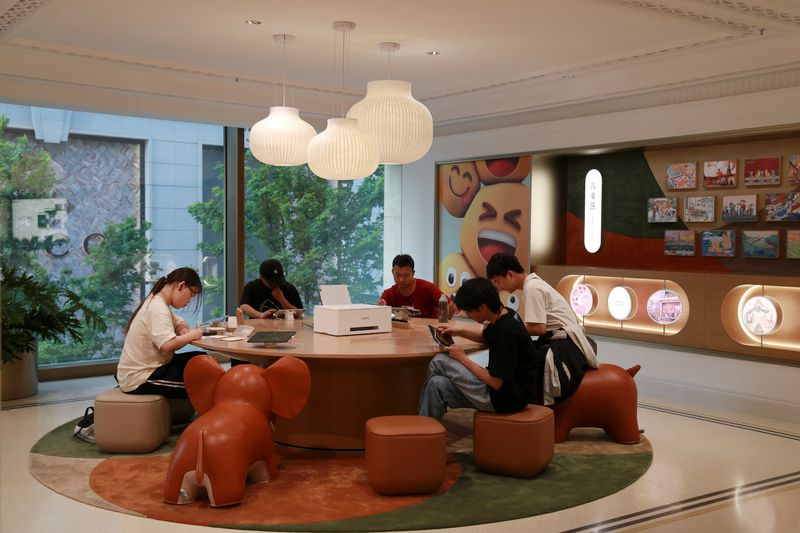By Josh Ye
HONG KONG (Reuters) - Huawei is revamping its retail strategy and aggressively opening flagship stores in China, with some just a stone's throw away from Apple (NASDAQ:AAPL) shops, as it seeks to retake the premium electronics throne in the world's biggest smartphone market.
Situated directly across from Apple's Shanghai flagship store, Huawei's recently renovated shop spans three floors of a famous heritage architecture building in the financial hub's busy shopping district and includes a coffee shop and a gym.
Huawei opened four such stores in major Chinese cities between December and February, an aggressive marketing blitz by a company that had largely relied on licensed distributors and is rebounding from U.S. sanctions imposed in 2019 that had crippled its smartphone business for four years until it could source domestic replacement parts.
"The Huawei flagship store is very nice. It looks much brighter inside compared to the Apple Store across the street," said Amy Chen, a 27-year-old physiotherapist who visited the Shanghai store this week to switch to Huawei's top-end Pura 70 Ultra from the iPhone 15 Pro in hopes of better mobile reception.
Apple has 47 stores in mainland China. Huawei, which did not open a flagship store until 2019, now has 11 of them.
"I think they will open more than 20 of them. Then it will eventually catch up to Apple," said Ethan Qi, associate director at research firm Counterpoint.
It marks a stark contrast to 2021 when the company's licensed stores were shuttered across China due to product shortages caused by the U.S. sanctions.
Huawei has since developed its own chips, introduced highly popular 5G-capable products and, according to sources, has started aggressively recruiting dealers in recent months.
"As Huawei now manages to ship in large quantities, given the good profit margin they could provide, (distributors) have become willing to purchase Huawei devices again," Qi said. "Previously, many couldn't get stock and their 4G devices didn't sell well."
Huawei has been actively bargaining with distributors, touting the above industry average profit margins of its phones and sometimes demanding exclusionary clauses to turn them into its exclusive partners, according to two industry sources.
More than 5,200 stores licensed to sell Huawei products sprang up through the first 10 months of 2023, with more than half of them in third and fourth-tier cities, according to market research firm GeoQ, helping Huawei expand its army of distribution partners nationwide.
Its renewed marketing push poses a major challenge to Apple, which suffered a 6.6% plunge in iPhone sales in China to 10.8 million in the first quarter, according to IDC data. By contrast, Huawei boosted its smartphone shipments by 110% to 11.7 million in the first quarter and overtook Apple as the No.2 smartphone vendor in China.
Huawei and Apple did not respond to requests for comment.
PREMIUM PUSH
Lucas Zhong, an analyst at research firm Canalys, said Huawei had plans to build out its flagship stores since 2020 but the progress was slowed by the U.S. sanctions, which led to a much slower iteration of its high-end products.
There are still supply chain issues leading to shortages of specific models, but they are under much better control and the new phones are garnering good reviews. That means Huawei is now putting its focus squarely on selling premium products that compete with Apple, according to analysts.
Its latest Pura 70 Ultra smartphone, for example, starts at 9,999 yuan ($1,300), matching the price tag of the iPhone 15 Pro Max, while Samsung (KS:005930) and Xiaomi (OTC:XIACF) are keeping prices for their premium models lower amid soft market demand.
Huawei's luxurious flagship stores display premium products ranging from smartphones to tablets, smartwatches, televisions and even electric vehicles made in partnership with Chinese automakers.
"Huawei now has a long product line," Qi said. "They need big demo areas… They will have to do it themselves because their distributors don't have the capability to rent such a massive area."
The push to build more of its own stores also underscores Huawei's heavy reliance on offline sales. Between 70% and 80% of Huawei's sales come from physical stores, while Apple sees about 40% of its sales coming from online, according to Toby Zhu, another analyst at Canalys.
"Xiaomi, Oppo and Vivo are all being affected (by Huawei's comeback)," Zhu said, referring to other Chinese smartphone makers. "But for now, the biggest impact has been on Apple."
And the impact is beginning to be felt beyond mainland China.
Simon Lam, owner of a popular smartphone shop named Trinity Electronics in Hong Kong, said more independent smartphone shops had started selling Huawei devices in recent months.

"Everybody is stocking up on some Huawei right now. Some more, some less," he said. "People are willing to pay a lot of money for high-end Huawei, something other brands really can't compare with."
($1 = 7.2259 Chinese yuan renminbi)